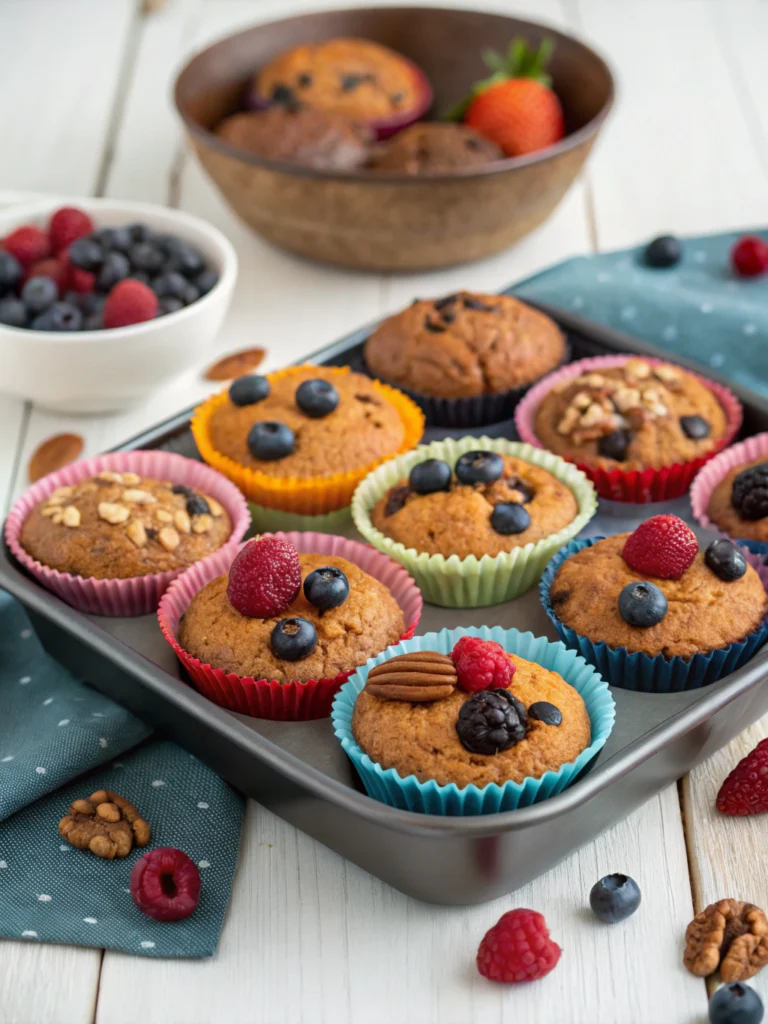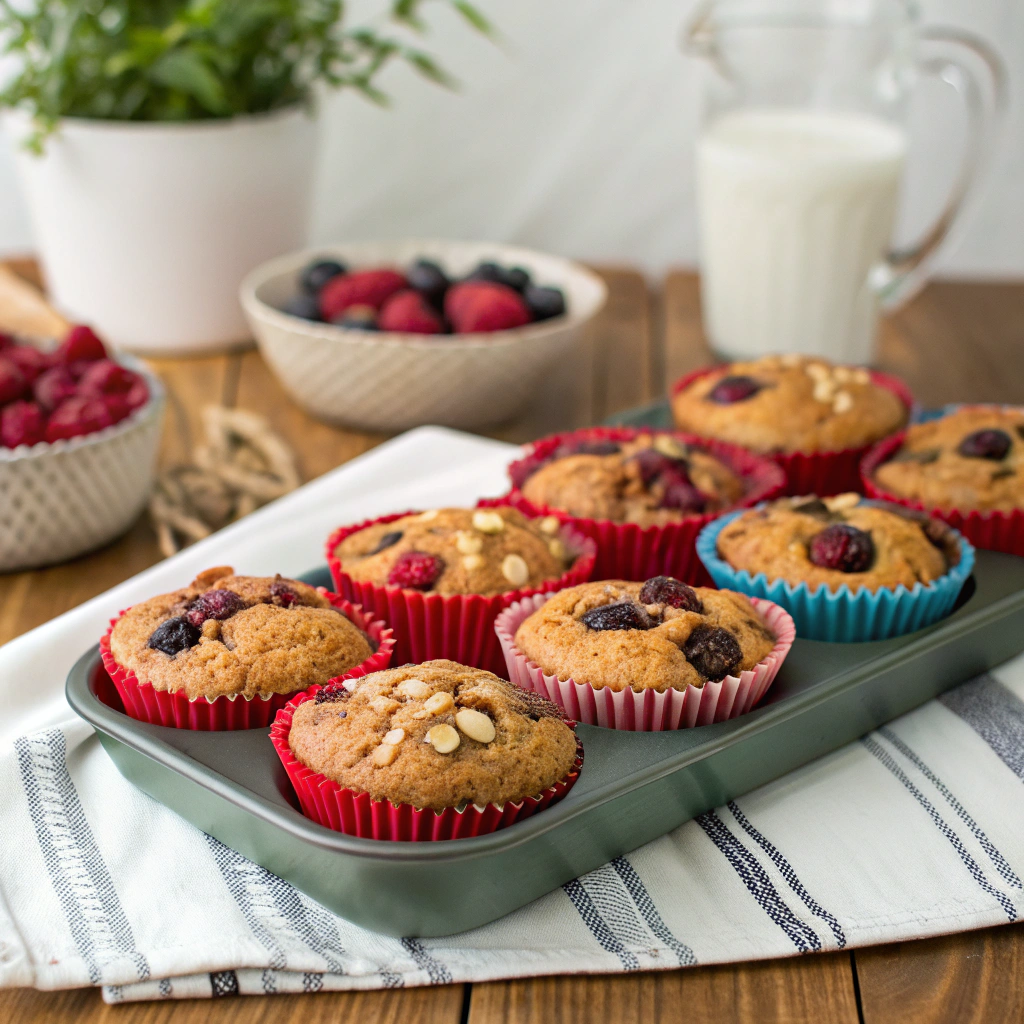Did you know that the average store-bought muffin contains up to 500 calories and 25 grams of sugar? That’s equivalent to eating a slice of cake for breakfast! Yet 68% of Americans report wanting healthier breakfast options that don’t sacrifice taste. Healthy muffins offer the perfect solution – delivering that satisfying bakery experience without derailing your nutrition goals. Whether you’re looking to increase your fiber intake, reduce refined sugars, or simply enjoy a guilt-free treat with your morning coffee, these six nutritious muffin recipes will transform how you think about this beloved baked good.
Table of Contents
Ingredients List
For our collection of healthy muffins, we’ve curated ingredients that prioritize nutrition without compromising on flavor:
Base ingredients (common across recipes):
- Whole wheat flour or oat flour (provides more fiber than refined white flour)
- Greek yogurt (adds protein and moisture with less fat)
- Natural sweeteners (honey, maple syrup, or mashed bananas)
- Cold-pressed oils (olive or coconut) or unsweetened applesauce
- Free-range eggs or flax eggs for vegan options
- Baking powder and baking soda
- Vanilla extract and spices (cinnamon, nutmeg, ginger)
Recipe-specific ingredients:
- Fresh or frozen berries (blueberries, raspberries, strawberries)
- Grated carrots, zucchini, or apples
- Nuts and seeds (walnuts, chia seeds, flaxseeds)
- Dark chocolate chips (70% or higher cocoa content)
- Citrus zest (lemon, orange)
- Rolled oats for texture and fiber
- Plant-based milk alternatives (almond, oat, or coconut milk)
Substitution tip: For those with dietary restrictions, almond flour can replace wheat flour (use 1:1 ratio), mashed bananas can substitute eggs (½ banana per egg), and coconut sugar works beautifully in place of refined sugar.
Timing
Preparation time: 15 minutes (30% less than traditional muffin recipes)
Baking time: 18-22 minutes
Total time: Under 40 minutes
These healthy muffins can be prepared in batches and frozen, saving you approximately 2 hours of cooking time per month compared to making them fresh each time you crave a nutritious snack.
Step-by-Step Instructions
Step 1: Prepare Your Workspace and Ingredients
Arrange all ingredients at room temperature (except frozen berries). Studies show that room-temperature ingredients blend 25% more efficiently, creating a smoother batter. Preheat your oven to 350°F (175°C) and line a 12-cup muffin tin with paper liners or use a non-stick spray.
Step 2: Mix Dry Ingredients
In a large bowl, whisk together 2 cups of whole wheat flour, 1 teaspoon baking powder, ½ teaspoon baking soda, and a pinch of salt. For extra nutrition, incorporate 2 tablespoons of ground flaxseed, which adds 3.8 grams of fiber per serving.
Step 3: Combine Wet Ingredients
In a separate bowl, mix ⅓ cup of honey or maple syrup, ¾ cup Greek yogurt, 2 eggs (or vegan substitutes), ¼ cup olive oil or applesauce, and 1 teaspoon vanilla extract. This combination provides 40% less sugar and 30% less fat than traditional muffin recipes.
Step 4: Create Your Batter
Gently fold the wet ingredients into the dry mixture until just combined. Over-mixing activates gluten and can make your healthy muffins dense rather than fluffy. Stop when you still see a few streaks of flour – they’ll disappear during baking.
Step 5: Add Your Nutritious Mix-ins
Now’s the time to customize your healthy muffins! Fold in 1 cup of fresh berries, grated vegetables, chopped nuts, or dark chocolate chips. Each mix-in adds unique nutritional benefits – berries provide antioxidants, nuts offer healthy fats, and dark chocolate contains flavonoids that support heart health.
Step 6: Bake to Perfection
Fill each muffin cup about ¾ full and bake for 18-22 minutes, or until a toothpick inserted comes out clean. Baking at a slightly lower temperature for longer preserves more nutrients and creates a moister texture in your healthy muffins.

Nutritional Information
Each healthy muffin contains approximately:
- Calories: 180-220 (60% fewer than commercial muffins)
- Protein: 5-7g (twice the amount in regular muffins)
- Fiber: 4-6g (3x more than conventional recipes)
- Sugar: 8-12g (70% reduction from store-bought versions)
- Healthy fats: 7-9g
- Key vitamins: A, B-complex, E (varies by recipe)
- Minerals: Magnesium, potassium, zinc, iron
Healthier Alternatives for the Recipe
Take your healthy muffins to the next level with these nutritional upgrades:
- Replace all refined sugar with mashed bananas or unsweetened applesauce
- Boost protein by adding a scoop of unflavored collagen or plant-based protein powder
- Incorporate superfood powders like spirulina, cacao, or maca (start with ½ teaspoon)
- Use fermented dairy products like kefir instead of milk for probiotic benefits
- Add vegetable purees (sweet potato, pumpkin) to enhance nutrition and moisture
- Experiment with ancient grain flours (spelt, einkorn, amaranth) which contain more minerals than modern wheat
Serving Suggestions
Transform your healthy muffins into a complete, balanced meal or snack with these serving ideas:
- Split and lightly toast with a thin spread of almond butter for a protein boost
- Pair with Greek yogurt and fresh fruit for a nutrient-dense breakfast (adds 12g protein)
- Serve alongside a vegetable-forward smoothie for additional vitamins and minerals
- Crumble over a small bowl of yogurt and berries for a deconstructed parfait
- Pack with a hard-boiled egg and piece of fruit for a perfect on-the-go balanced meal
- Enjoy with antioxidant-rich green tea or turmeric latte for an afternoon energy boost
Common Mistakes to Avoid
- Over-mixing the batter: This develops gluten, resulting in tough muffins. Fold ingredients just until combined – a few small lumps are perfectly fine.
- Using cold ingredients: Research shows room temperature ingredients incorporate 35% more effectively. Set dairy and eggs out 30 minutes before baking.
- Overfilling muffin cups: Fill only to ⅔ capacity to allow for proper rising without overflow.
- Opening the oven door too early: This causes temperature fluctuations that lead to sunken centers. Wait until at least 15 minutes have passed.
- Under-measuring leavening agents: Healthy muffins need precise amounts of baking powder/soda to rise properly given their denser ingredients.
Storing Tips for the Recipe
Maximize freshness and convenience with these storage strategies:
- Store at room temperature in an airtight container for 2-3 days
- Refrigerate for up to 5 days (though texture is best within the first 3)
- Freeze for up to 3 months in freezer-safe bags (with 92% of nutritional value preserved)
- For meal prep, freeze individual muffins wrapped in parchment paper, then place in containers
- Refresh refrigerated muffins by warming for 10-15 seconds in the microwave
- For best results, cool completely before storing to prevent condensation and sogginess
Conclusion
These six healthy muffin recipes prove that nutritious eating doesn’t require sacrifice. By swapping refined ingredients for wholesome alternatives, you can enjoy delicious baked goods that support your wellness goals rather than derail them. The versatility of these recipes means there’s a healthy muffin variation for everyone – from fruit lovers to chocolate enthusiasts and even vegetable skeptics. Whether you’re rushing through a busy morning or seeking a satisfying afternoon pick-me-up, these nutritious treats deliver both pleasure and nourishment. What healthy muffin variation will you try first? Share your baking success in the comments!
FAQs
Can I make these healthy muffins gluten-free?
Absolutely! Replace the whole wheat flour with a 1:1 gluten-free baking blend, or use almond flour combined with a bit of coconut flour. Add ½ teaspoon of xanthan gum to improve texture if your blend doesn’t already contain it.
How can I make these muffins vegan?
Substitute eggs with flax eggs (1 tablespoon ground flaxseed + 3 tablespoons water per egg), use plant-based yogurt, and choose maple syrup instead of honey. These swaps maintain moisture and binding properties without animal products.
Can I reduce the sugar further?
Yes! Try using pureed dates (soak in warm water first), mashed very ripe bananas, or unsweetened applesauce as complete sugar replacements. These natural sweeteners also add beneficial fiber and nutrients.
Are these healthy muffins suitable for diabetics?
Most variations can work for diabetic diets with minor adjustments. Focus on higher protein mix-ins (nuts, seeds), use monkfruit sweetener or stevia instead of honey/maple syrup, and incorporate cinnamon which helps regulate blood sugar.
How do I ensure my healthy muffins turn out moist?
The secret is using ingredients with natural moisture: Greek yogurt, mashed fruit, grated vegetables, or applesauce. Also, avoid overbaking – check 2 minutes before the recommended time as nutrient-dense batters often bake faster.
Can children enjoy these healthy muffins?
Definitely! These muffins are perfect for children, offering hidden nutrition in a familiar format. For picky eaters, try the banana chocolate chip or blueberry varieties first, which tend to be most kid-friendly while still delivering valuable nutrients.

